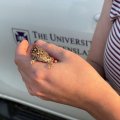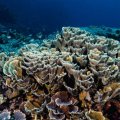Australia may take a place in the front line of the global biochemical industry thanks to a new partnership between The University of Queensland and a major South Korean academy.
UQ and the Korea Advanced Institute of Science and Technology have teamed up to develop and patent the technology to convert sugar cane into “green” plastics and chemicals.
Queensland Premier Peter Beattie witnessed the signing of a UQ-KAIST agreement in Seoul today.
UQ Senior Deputy Vice-Chancellor Professor Paul Greenfield, who signed the agreement, said that the $2000 billion global chemical industry was expected to shift from reliance on oil to reliance on biomass in coming decades.
“Researchers from UQ’s Australian Institute for Bioengineering and Nanotechnology (AIBN) and KAIST will aim to perfect the technology to use sugar cane instead of fossil fuel to manufacture plastics and chemicals,” Professor Greenfield said.
“As well as assisting economic growth and job creation in Australia, this will help Australians contribute to a better global environment.
“Replacing oil with sugarcane would reduce the use of non-renewable resources for chemicals by up to 90 percent. Chemical production currently accounts for seven percent of the world’s energy use,” Professor Greenfield said.
Mr Beattie said: “Now we have one of the world’s top research partnerships on the case, and that means we’re driving a whole new industry.”
The UQ-KAIST partnership matches Queensland’s strengths in sugar cane production with South Korea’s status as a global chemicals giant.
It offers the potential to create jobs in regional Australia. Biorefineries should be built close to cane farms in order to use low cost, green energy supplied by bagasse (a sugar by-product). About 1000 employees would be needed to build a biorefinery.
Recent advances in biotechnology allow us to “program” microorganisms to make complex chemicals from simple renewables such as sugar cane. KAIST, regarded as the “MIT of South Korea”, is a world leader in this programming, while UQ’s AIBN has world-class experts in bioplastic production and characterization.
“We have things that South Korea needs: raw materials for biochemicals; and bioplastics research expertise,” Professor Greenfield said.
AIBN is Australia’s only fully-integrated research institution where scientists and engineers collaborate to solve problems at the point where biotechnology and nanotechnology meet.
Media inquiries: fiona.kennedy@uq.edu.au ph: 61 413 380 012


